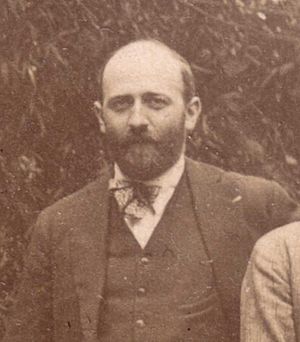Jean Rivier facts for kids
Jean Rivier (born July 21, 1896 – died November 6, 1987) was a French composer. He wrote classical music in a style called neoclassical. This means his music often used ideas from older classical music but with a fresh, modern twist.
Jean Rivier's father, Henri Rivier, helped invent something called Armenian paper. Jean himself wrote over 200 pieces of music. These included works for full orchestra, smaller groups of instruments (called chamber groups), chorus (singing groups), piano, and solo instruments.
From 1948 to 1966, Rivier was a professor at the famous Paris Conservatory, teaching how to compose music. For part of that time (1948–1962), he shared his teaching role with another well-known composer, Darius Milhaud. Some of his students who became notable composers were Gareth Walters, Pedro Ipuche Riva, and Gerd Boder. See: List of music students by teacher: R to S#Jean Rivier.
His Musical Journey
Jean Rivier was very active in the French music world. This was especially true after World War I until he passed away. Even though he wrote many pieces, his music was sometimes overshadowed. This happened because other French composers were creating more experimental or "avant-garde" music.
Rivier was also a founding member of Triton. This was a special music group that helped new music get heard. He also worked a lot with French Radio (ORTF).
His songs are known for being short and detailed. They often have beautiful, singing melodies. His music used traditional harmonies but also added creative, interesting sounds. Many of his songs followed a clear structure, often an ABA form. This means a musical idea is presented (A), then a different idea (B), and then the first idea comes back (A).
What Music Did He Write?
Jean Rivier composed a wide variety of music for different instruments and groups. Here are some of his many works:
- 3 Points Seches for piano
- 4 Fantasmes for piano
- 4 Sequences Dialogues (need instrumentation)
- Alternances for piano
- Andante Espressivo Ed Allegro Burlesco (three movements) for clarinet and piano
- Aria for trumpet (or oboe) and organ
- Brillances for 2 trumpets, 2 French horns, 2 trombones and 1 tuba
- Capriccio (need instrumentation)
- Comme Une Tendre Berceuse for flute and piano
- Concerto (arranged by Rene Decouais) (need instrumentation)
- Concerto for alto saxophone, trumpet and string orchestra (1955)
- Concerto for alto saxophone, baritone saxophone, 2 bassoons, trumpet, double bass
- Concerto for bassoon and strings (1963)
- Concerto for clarinet and string orchestra (1958)
- Concerto for flute and piano
- Concerto for oboe and orchestra (or piano) (1966)
- Concerto for trumpet and strings
- Concerto #1 in C for piano and orchestra (1940)
- Concerto Brève for piano and strings (1953)
- Concertino for saxophone and orchestra (or piano)
- Concertino for viola and orchestra (1947)
- Déjeuner sur l'herbe (need instrumentation)
- Doloroso et Giocoso for viola and piano (1969)
- Duo for flute and clarinet in Bb
- Espagnole for violin and piano
- Grave et Presto for saxophone quartet
- Nocturne, his contribution to Variations sur le nom de Marguerite Long
- Le Petit Gondolier for piano
- Les Trois "S" for clarinet
- Oiseau tendre for solo flute
- Ouverture pour une opérette imaginaire
- 3 Pastorales for Orchestra (1929)
- Petite suite (for oboe, clarinet & bassoon, 1934)
- Piece in D (Pièce en Ré pour contrebasse et piano, 1920)
- Pour Des Mains Amies for piano
- Priere (need instrumentation)
- Quatuor A Cordes #1 (string quartet #1) (1924)
- Quatuor A Cordes #2 (string quartet #2) (1940)
- Rapsodie for trombone and piano
- Requiem (need instrumentation)
- Sonate for piano
- Stridences for piano
- String Trio
- Symphony #1 (1931)
- Symphony #2 in C major for string orchestra (1937)
- Symphony #3 in G major for string orchestra (1937)
- Symphony #4 in B flat major for string orchestra (1947)
- Symphony #5 in A minor (1950)
- Symphony #6 in E minor "Les Présages" (1958)
- Symphony #7 in F major "Les Contrastes" (1971)
- Symphony #8 for string orchestra (1978)
- Torrents for piano
- Trois Mouvements for clarinet and piano
- Virevoltes for flute
All of his piano pieces have been put together and published in one book by Salabert.
Listening to His Music
You can find some of Jean Rivier's music on these recordings:
- Concerto for Alto Saxophone, Trumpet and Orchestra is on an album called "French Saxophone Concertos" (Naxos 8.225127).
- Concerto for alto saxophone, trumpet and strings is on "Virtuoso Saxophone Concertos" (Koch Schwann).
- Oiseaux tendres is on "WIESLER, Manuela: Flute Music" (Naxos BIS-CD-689).
- String Quartets No 1 and 2, performed by the Mandelring Quartet (Audite 97.710, 2021).
- Symphonies #3 in G, #4 in B♭, and #8 (all for strings) were recorded by the Calmel Chamber Orchestra, conducted by Bernard Calmel (Pavane CD ADW 7328, 1994). This recording is currently out of print.
See also
 In Spanish: Jean Rivier para niños
In Spanish: Jean Rivier para niños
 | Emma Amos |
 | Edward Mitchell Bannister |
 | Larry D. Alexander |
 | Ernie Barnes |


